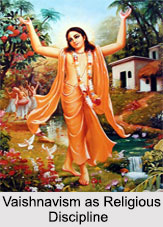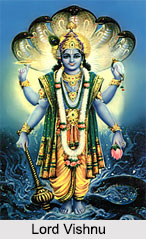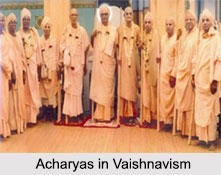 Vaishnavism as Religious Discipline follows from the philosophical theories that are found in the Upanishads. The philosophy and religion of Vaishnavism are complementary and the two together constitute one single system of philosophy of religion representing two different aspects. As a monotheistic religion, Vaishnavism lays equal emphasis on a specific ethical and religious way of life aimed at the attainment of the highest spiritual goal. It comprises the cultivation of certain ethical virtues and performance of certain important religious duties.
Vaishnavism as Religious Discipline follows from the philosophical theories that are found in the Upanishads. The philosophy and religion of Vaishnavism are complementary and the two together constitute one single system of philosophy of religion representing two different aspects. As a monotheistic religion, Vaishnavism lays equal emphasis on a specific ethical and religious way of life aimed at the attainment of the highest spiritual goal. It comprises the cultivation of certain ethical virtues and performance of certain important religious duties.
Discussed below are some of the vital elements of the practice of Vaishnavism as a religious discipline.
Role of Acharya in Vaishnavism
One of the essential requirements for a Vaishnava in order to lead a religious life is to have a well qualified Acharya or Guru. The Upanishad enjoins that one should approach a proper Guru in order to comprehend the philosophic truth. Only such knowledge as obtained through the teachings of a Guru will be useful for practising the Sadhana laid down by the Vedanta for achieving the spiritual goal. Being connected with a Guru, one should show him the utmost respect. It is laid down as an important moral obligation that one should worship an Acharya in the same way as one worships God.
Guru Parampara in Vaishnavism
According to Vaishnavism, the Supreme Lord; Narayana is the first and foremost of all deities. He is the Guru of the entire world but He himself does not have any preceptor. According to tradition, He taught the Vedas to Chaturmukha Brahma and the latter in turn to his sons and others. He disseminated Vedic knowledge through the great sages such as Narada, Parasara and Saunaka. Vaishnava tradition claims a long lineage of Acharyas commencing from the Supreme Being right up to the Guru of an individual.
 Sacraments in Vaishnavism
Sacraments in Vaishnavism
The Vaishnava theology has laid down a five-fold sacrament known as "Panchasarhskara" as an essential requirement for an individual to become fully qualified as a Vaishnava. In a broad sense, any individual who is a devotee of Lord Vishnu is a Vaishnava. In order to qualify oneself to become a fit person to worship Lord Vishnu, one is required to go through the prescribed initiation ceremony to be conducted by a qualified preceptor. The sacraments known "Aspahca Samskara" comprise 5 simple ceremonies:
1. Tapa or wearing the mark of the conch and discus, the two weapons of Vishnu, on the left and right shoulder blades of the initiate;
2. Pundra or applying on the forehead the mark in the shape of Vishnu"s feet;
3. Nama or naming the initiate as Vishnu Dasa;
4. Mantra or imparting the esoteric Vaishnava mantras", and
5. Ijya or formal instruction of the mode of worship of God.
This practice of Panchasarhskara has been made an obligatory rite for all Vaishnavas and is being followed since Ramanuja"s time as an essential sacrament of purification.
Daily Religious Duties of Vaishnavas
A true Vaishnava is required to dedicate himself to the worship and service for Lord Vishnu throughout the day; right from the early morning to the midnight. The Pancharatra Samhitas have divided the day into 5 parts and laid down a specific religious routine to be observed by a devoted Vaishnava at each time of the day. This fivefold religious routine is known as "Panchakala Prakriya". This comprises:
1. Abhigamana or Morning Prayer,
2. Upaddita or collection of the requisite materials for worship,
3. Ijya or formal worship of God,
4. Svadhyaya or recitation and study of sacred texts, and
5. Yoga or contemplation on God.
 Kaihkarya for Bhagavada
Kaihkarya for Bhagavada
Vaishnavism has developed two types of worship of God in which any member of the society can participate and derive the same spiritual benefit as one would get from the performance of formal religious worship. These are known as Bhagavad Kaihkarya or service to God and Bhagavata Kaihkarya or service to Godly men. The concept of Kaihkarya gets an added emphasis in Vaishnavism with philosophical and theological justification. This concept is developed in Vaishnavism on the basis of the doctrine of the ontological relation of jiva or the individual self to God. The jiva by its very nature is absolutely dependent on God who is Supreme Lord. It exists for the pleasure of God and as a Dasa it is the intrinsic duty of an individual to serve God at all times and in all ways. On the basis of this doctrine, the Kaihkarya or service to God is ordained on jiva both during the states of bondage and mukti purely for the pleasure of God.
Vaishnava Dharma
More important than the observance of religious duties, Vaishnavism emphasises the need to cultivate certain ethical virtues in order to be a true Vaishnava. This is called the "Vaishnava Dharma". From the religious standpoint, the most important Vaishnava Dharma is the development of an unshakable faith that only Vishnu as the Supreme Being is the saviour. This would imply that as a true Vaishnava, he should not worship any deity other than Lord Vishnu. However, a Vaishnava should show veneration to other deities too since they constitute the Vibhuti or glory of Vishnu. The adoration of Vishnu also implies the need of showing utmost respect to the God`s devotees (Bhagavatas). Along with this, a Vaishnava should develop compassion towards all other living beings in general. Besides compassion, a Vaishnava should cultivate a few other ethical virtues. These are truthfulness, integrity, dana or benevolence, non-violence and not coveting the property of others. A true Vaishnava should also develop a sense of fearlessness, mental equanimity and conduct himself well in society. Apart from this there are also other special values, social, ethical and spiritual which have been advocated by Vaishnavism.




















